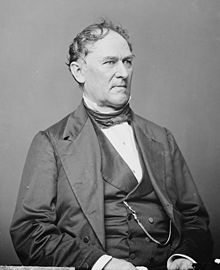Orville Hickman Browning
Orville Hickman Browning (born February 10, 1806 in Cynthiana , Kentucky , † August 10, 1881 in Quincy , Illinois ) was an American politician who held the post of Interior Minister in the cabinet of US President Andrew Johnson .
Life
After attending Augusta College , Browning studied law and was inducted into the bar in 1831. That same year he set up practice in Quincy as a lawyer. In 1832 he joined a volunteer regiment from Illinois that fought in the Black Hawk War . He made a name for himself as a lawyer in 1844 when he successfully defended five men charged with the murder of Joseph Smith , founder of The Church of Jesus Christ of Latter-day Saints .
politics
Orville Browning was politically active for the first time from 1836 to 1843 as a member of the Illinois Senate . In 1850 and 1852 he ran as Whig for a seat in the US House of Representatives , but failed each. When a meeting against the Kansas-Nebraska Act was held in Bloomington in May 1856 , Browning attended as a delegate; at this convention the foundation for the establishment of the Republican Party was laid.
Browning then joined the Republicans and was a member of this party on June 26, 1861 US Senator for Illinois; he succeeded the late Stephen A. Douglas . He was denied re-election, so he resigned from the Senate on January 12, 1963. President Abraham Lincoln , whose personal friends included Browning, reportedly planned to appoint him to succeed Caleb Blood Smith as Home Secretary; but that did not happen.
It was not until Lincoln's successor Andrew Johnson brought Browning into his cabinet on September 1, 1866 , after the previous Secretary of the Interior James Harlan resigned from office due to political differences with the president. Browning was a member of the cabinet until the end of Johnson's tenure on March 4, 1869, and temporarily headed the Justice Department for a short time . He returned to Illinois, where he was a delegate to the Constitutional Convention in 1869 and subsequently worked as a lawyer again.
Web links
- Orville Hickman Browning in the Biographical Directory of the United States Congress (English)
- Mr. Lincoln's White House
- Orville Hickman Browning in the Miller Center of Public Affairs of the University of Virginia (English)
| personal data | |
|---|---|
| SURNAME | Browning, Orville Hickman |
| BRIEF DESCRIPTION | American politician |
| DATE OF BIRTH | February 10, 1806 |
| PLACE OF BIRTH | Cynthiana , Kentucky |
| DATE OF DEATH | August 10, 1881 |
| Place of death | Quincy , Illinois |


